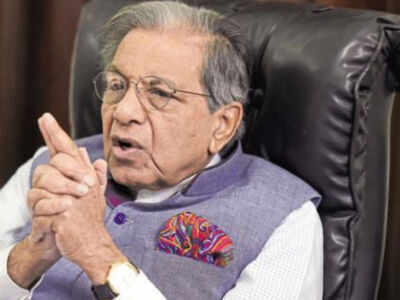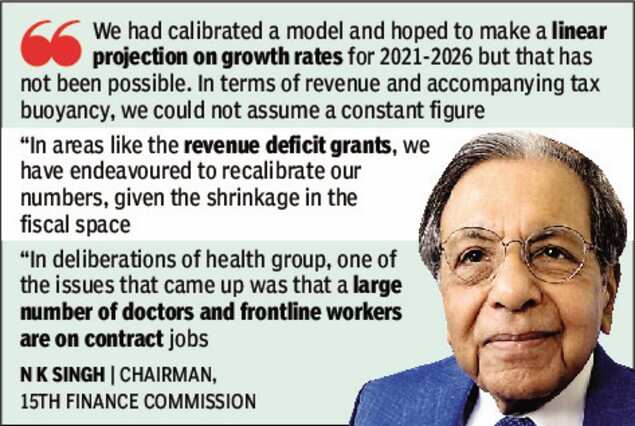
NEW DELHI: In three weeks, the 15th finance commission is due to submit its report, setting the road map for sharing of financial resources between the Centre and states for the next five years. In an interview, its chairman N K Singh discusses the issues with TOI. Excerpts:
How far are you from finishing your report?
This is the last-mile spurt. Fortunately, so far, this has gone smoothly. The last lap is always more difficult as we put together all the recommendations.
From the time you submitted your first report to now, the world has changed and so would be the assumptions and framework. How have you recalibrated your approach?
When we had given our report for 2020-21, we believed that the economy was coming out of transitional issues, including a global slowdown. We had calibrated a model and we had hoped to make a linear projection on growth rates for the five-year period (2021-2026), but that has not been possible.
In terms of revenue and accompanying tax buoyancy, we could not assume a constant figure. As a consequence, we have sought to recalibrate the permissible expenditure limits, making certain assumptions, which ensured that there was expenditure management and control and re-prioritisation. In areas like the revenue deficit grants, we have endeavoured to recalibrate our numbers, given the shrinkage in fiscal space.
What are the big things we should watch out for?
There are issues such as depleting groundwater level in agriculture and the need for incentivising states or a recognition that agri-export is only a fraction of the potential. Similarly, on power, we have sought to address the issue of deeper reforms.
On the issue of fiscal consolidation, there is preponderance of opinion among the members of my Economic Advisory Council that the FRBM law, including amendments of 2018, may have outlived its utility and we may need to revisit some of the more fundamental assumptions. There is an unsettled debate on whether we need cyclically adjusted fiscal deficit targets or have a range instead of a fixed point.
We have tried to address some of the issues regarding the new fiscal road map. We have recognised that it is the inescapable and indivisible obligation of every citizen of the country that the highest priority must be given to defence.

Does the pandemic show how the Centre and states have been spending inadequately on health and has it been addressed in your report?
There is inadequacy of public health expenditure and it is not unique to the current situation or this government. We spend less than 1% of GDP on health. Many state governments need to re-prioritise their public outlay. The finance minister has said that the central government also needs to spend more. When the All-India Services Act, 1951 was enacted, it did talk of creating an Indian Medical Service, like the IAS and IPS. This suggestion was there in 1767.
Do you see the finance commission playing a balancing act between the Centre and states and if the Constitution was being written today, is it more relevant in today’s context?
The Constitution says it must be appointed every five years. Convention has it that finance commissions give their awards for five years. Today, economy and geopolitics change very quickly and making projections for five years is fraught with uncertainty. The finance commission must not be self-perpetuating. But, the discontinuity between two commissions and inability for course correction (when projections going wrong) are issues that need attention.
How far are you from finishing your report?
This is the last-mile spurt. Fortunately, so far, this has gone smoothly. The last lap is always more difficult as we put together all the recommendations.
From the time you submitted your first report to now, the world has changed and so would be the assumptions and framework. How have you recalibrated your approach?
When we had given our report for 2020-21, we believed that the economy was coming out of transitional issues, including a global slowdown. We had calibrated a model and we had hoped to make a linear projection on growth rates for the five-year period (2021-2026), but that has not been possible.
In terms of revenue and accompanying tax buoyancy, we could not assume a constant figure. As a consequence, we have sought to recalibrate the permissible expenditure limits, making certain assumptions, which ensured that there was expenditure management and control and re-prioritisation. In areas like the revenue deficit grants, we have endeavoured to recalibrate our numbers, given the shrinkage in fiscal space.
What are the big things we should watch out for?
There are issues such as depleting groundwater level in agriculture and the need for incentivising states or a recognition that agri-export is only a fraction of the potential. Similarly, on power, we have sought to address the issue of deeper reforms.
On the issue of fiscal consolidation, there is preponderance of opinion among the members of my Economic Advisory Council that the FRBM law, including amendments of 2018, may have outlived its utility and we may need to revisit some of the more fundamental assumptions. There is an unsettled debate on whether we need cyclically adjusted fiscal deficit targets or have a range instead of a fixed point.
We have tried to address some of the issues regarding the new fiscal road map. We have recognised that it is the inescapable and indivisible obligation of every citizen of the country that the highest priority must be given to defence.

Does the pandemic show how the Centre and states have been spending inadequately on health and has it been addressed in your report?
There is inadequacy of public health expenditure and it is not unique to the current situation or this government. We spend less than 1% of GDP on health. Many state governments need to re-prioritise their public outlay. The finance minister has said that the central government also needs to spend more. When the All-India Services Act, 1951 was enacted, it did talk of creating an Indian Medical Service, like the IAS and IPS. This suggestion was there in 1767.
Do you see the finance commission playing a balancing act between the Centre and states and if the Constitution was being written today, is it more relevant in today’s context?
The Constitution says it must be appointed every five years. Convention has it that finance commissions give their awards for five years. Today, economy and geopolitics change very quickly and making projections for five years is fraught with uncertainty. The finance commission must not be self-perpetuating. But, the discontinuity between two commissions and inability for course correction (when projections going wrong) are issues that need attention.
Download
The Times of India News App for Latest Business News
more from times of india business

Coronavirus outbreak
Business News
LATEST VIDEOS
Business
 Government initiates investigation against advance remittances of Rs 2.6 lakh crore
Government initiates investigation against advance remittances of Rs 2.6 lakh crore  India gets second set of Swiss bank account details of its nationals and entities under AEOI pact
India gets second set of Swiss bank account details of its nationals and entities under AEOI pact  RBI makes home loans above Rs 75 lakh cheaper
RBI makes home loans above Rs 75 lakh cheaper  One in every five small enterprises failed to pay its loan EMI in September: Survey
One in every five small enterprises failed to pay its loan EMI in September: Survey
More from TOI
Navbharat Times
Featured Today in Travel
Quick Links
ELSS Mutual Funds BenefitsIncome Tax Refund statusWhat is AssochamITR Filing Last DateHome Loan EMI TipsHome Loan Repayment TipsPradhan Mantri Awas YojanaTop UP Loan FeaturesIncrease Home Loan EligibilityHome Loan on PFTax Saving Fixed DepositLink Aadhaar with ITRAtal Pension YojanaNita AmbaniIndian EconomyRBIAadhaar CardSBIReliance CommunicationsMukesh AmbaniIndian Bank Ifsc codeIDBI Ifsc codeIndusind ifsc codeYes Bank Ifsc CodeVijay Bank Ifsc codeSyndicate bank Ifsc CodePNB Ifsc codeOBC Ifsc codeKarur vysya bank ifscIOB Ifsc codeICICI Ifsc codeHDFC Bank ifsc codeCanara Bank Ifsc codeBank of baroda ifscBank of America IFSC CodeBOM IFSC CodeAndhra Bank IFSC CodeAxis Bank Ifsc CodeSBI IFSC CodeGST
Get the app



